牛津上海版英语九年级上册课件:Unit 1 Ancient Greece Grammar(共24张PPT)
文档属性
| 名称 | 牛津上海版英语九年级上册课件:Unit 1 Ancient Greece Grammar(共24张PPT) |

|
|
| 格式 | zip | ||
| 文件大小 | 17.6MB | ||
| 资源类型 | 教案 | ||
| 版本资源 | 牛津上海版(试用本) | ||
| 科目 | 英语 | ||
| 更新时间 | 2016-06-20 19:41:01 | ||
图片预览

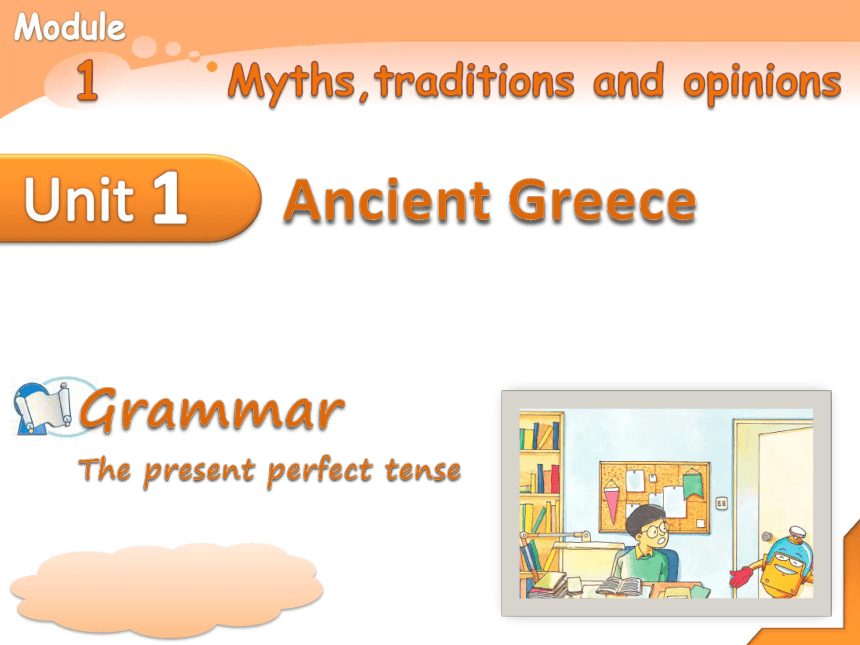
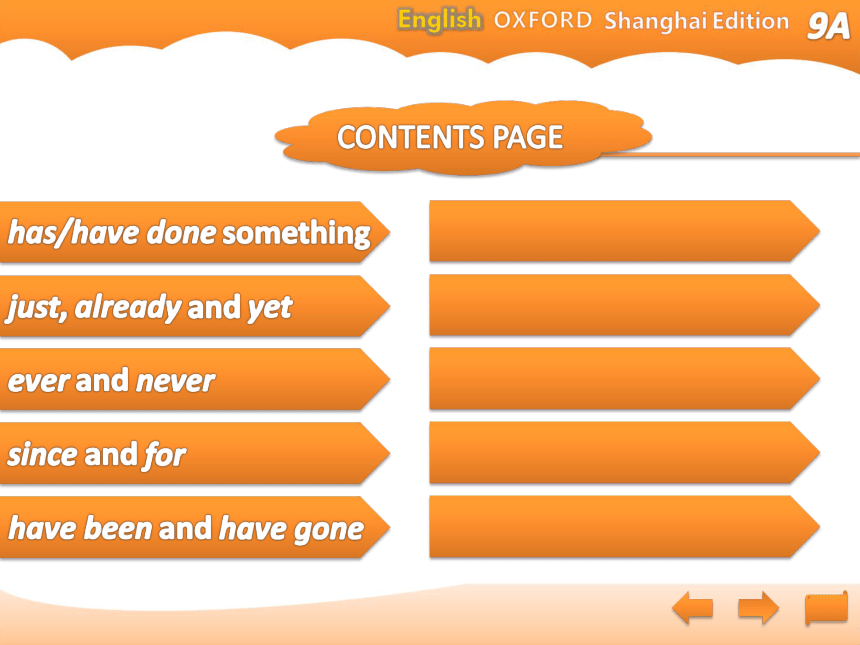
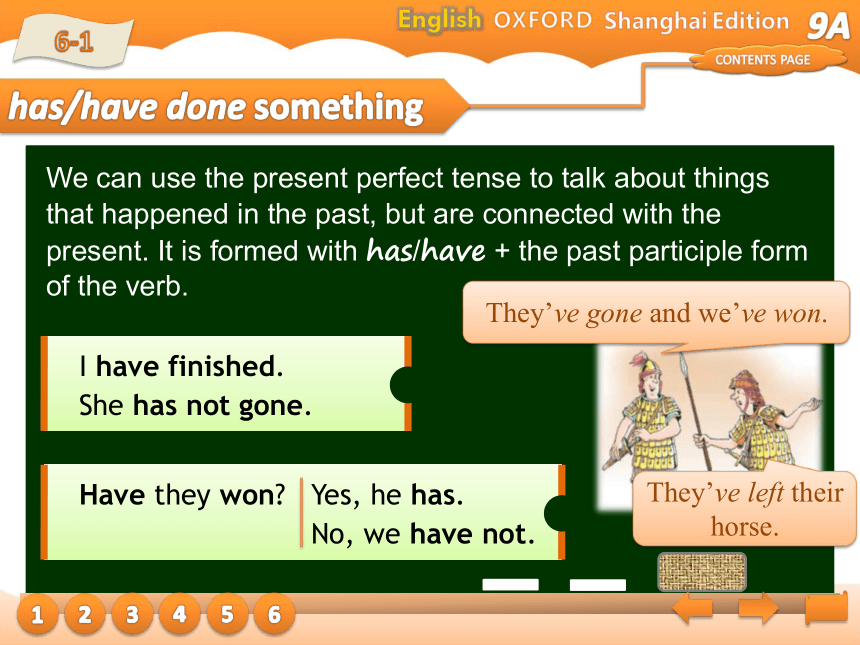
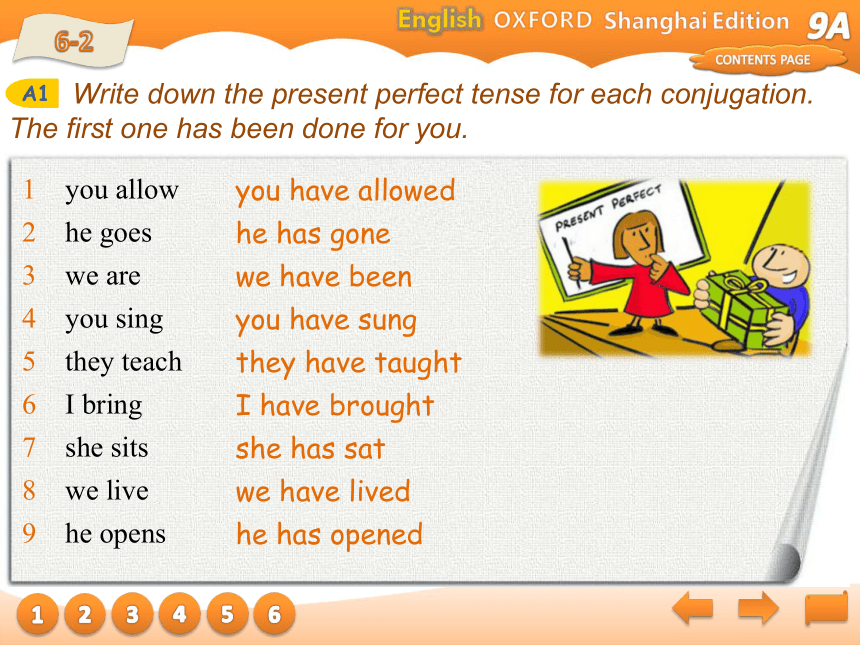



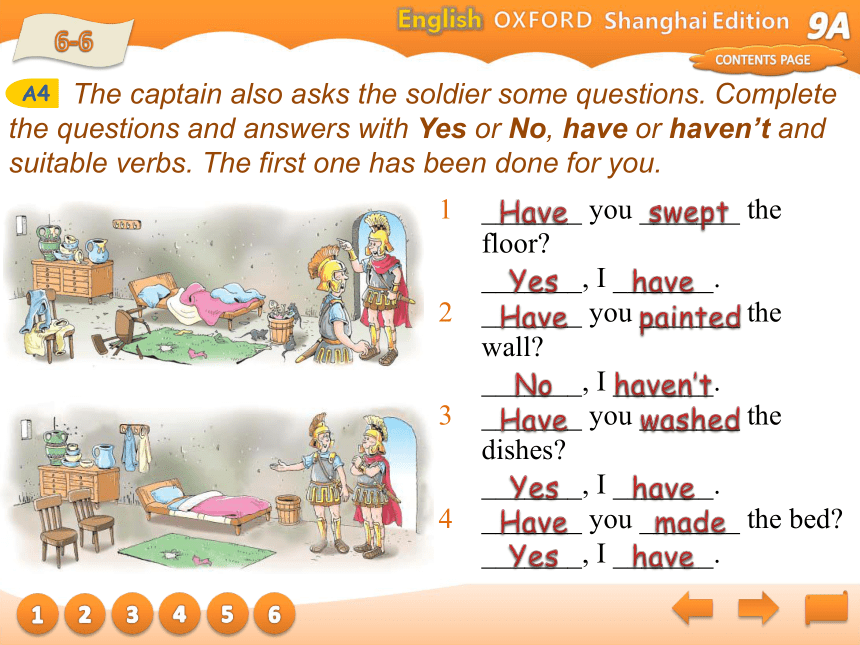
文档简介
课件24张PPT。1Myths,traditions and opinions1Ancient GreeceGrammar
The present perfect tenseCONTENTS PAGEhas/have done somethingjust, already and yetever and neversince and forhave been and have gonehas/have done something6-11234We can use the present perfect tense to talk about things that happened in the past, but are connected with the present. It is formed with has/have + the past participle form of the verb.They’ve gone and we’ve won.They’ve left their horse.56 Write down the present perfect tense for each conjugation. The first one has been done for you.A16-21234you allow
he goes
we are
you sing
they teach
I bring
she sits
we live
he opensyou have allowed
he has gone
we have been
you have sung
they have taught
I have brought
she has sat
we have lived
he has opened56 This is a soldier’s room. It is in a mess. The captain is giving him some orders to clean it.A26-31234Sweep the floor. Make the bed. Wash the dishes. Hang up the clothes. Fix the chair. Empty the rubbish bin. Paint the wall. Mend the hole in the carpet. And get rid of those rats!56At once, sir!The soldier has swept the floor. ____
He has not made the bed. ____
He has washed the dishes. ____
He has not painted the wall. ____6-41234 Now look at the picture below and say whether the following statements are T (True) or F (False).TFTT566-51234 Later the soldier reports to the captain. This is part of what he says. Look at the picture below and complete the sentences with have or have not, and suitable verbs.A3I (1)_________________ the chair.
I (2)_________________ the rubbish bin.
I (3)_________________ the clothes.
I (4)_________________ ___________ the carpet.have fixedhave emptiedhave hung up have not mended (the hole in)566-61234 The captain also asks the soldier some questions. Complete the questions and answers with Yes or No, have or haven’t and suitable verbs. The first one has been done for you.A4_______ you _______ the floor? _______, I _______.
_______ you _______ the wall? _______, I _______.
_______ you _______ the dishes? _______, I _______.
_______ you _______ the bed? _______, I _______.HavesweptYeshaveHavepaintedNohaven’tHavewashedYeshaveHavemadeYeshave56just, already and yet3-1123We can use just, already and yet with the present perfect tense.just = a very short time beforealready = before nowyet = up to nowin positive sentencesin negative sentences and questions Work in pairs. Take turns to ask and answer the following questions. Reply positively or negatively. Follow the example.B13-2123Would you like to have lunch with me?
Would you like to go to the cinema with me?
Would you like to read this book?
Would you like to have a drink?
Would you like to wash your hands?Would you like to have lunch with me?Yes, I would. I haven’t had lunch yet.No, I’m sorry, I wouldn’t. I’ve just/ already had lunch.OR Hans and his sister Anna are German. They plan to visit their friend Eric and his sister Doris in China. Hans phones Eric about the trip. Read their conversation, put the verbs in the right tense, and add just, already or yet.B23-3123Hans Hello, Eric. We will definitely come to see you next month.
Eric I am glad to hear it. (1)_______ you _______ (get) your plane tickets (2)_______ (already/yet)?
Hans I (3)_______ _______ _______ (get, just/yet) mine, but Anna (4)_______ ________ ________ (not get) hers (5)_______ (already/yet).
Eric Why is that?
Hans She (6)_______ _______ ________ (not save) enough money (7)_______ (already/yet). She will buy it next week. She is very excited about the trip. She (8)_______ ________ _______ (pack, already/yet) her suitcase. I (9)_______ _______ _______ (not pack) mine (10)_______ (already/yet).HavegotyethavejustgothasnotgotyethasnotsavedyethasalreadypackedhavenotpackedyetWe often use ever and never with the present perfect tense.ever = at any timenever = not at any timeWe usually use ever in questions.ever and never4-11234Hans answers questions (2), (6) and (8) like this:
Yes, I have.
He answers all the other questions like this:
No, I’ve never been in a __________.
OR No, I’ve never had a __________.
OR No, I’ve never seen a __________. Work in pairs. Hans is now in Shanghai for the first time. Eric wants to find out what to show him. Eric asks questions about the pictures below:C14-2123Have you ever been in a
(1) cable car? (2) maglev train?
Have you ever had a
(6) ride on a light rail train?
Have you ever seen a
(7) lion dance?44-3123No, I’ve never been in a cable car.Yes, I have.No, I’ve never been in a temple.No, I’ve never had a Chinese meal.No, I’ve never had a moon cake.Yes, I have.No, I’ve never seen a lion dance.Yes, I have.No, I’ve never seen a dragon boat race.4 Eric takes Hans out for a walk. He leaves a note about the above conversation for his sister Doris. Complete the note below with information in C1.C24-4123has never been in ahas never had ahas never seen ahas been in ahas had ahas seen a4We often use since and for with the present perfect tense.Since is used with a point in time.For is used with a period of time.since and for4-1123We often use how long to ask questions about duration in the present perfect tense.4Where does Hans live? He _______ in _______.
How long has Hans lived in Hamburg? He _______ _______ there _______ _______.How long has Doris lived in Shanghai? She _______ _______ here _______ _______ _______.
Where was Doris born? She _______ _______ _______ _______. Hans is from Hamburg in Germany. He is talking to Doris. Read their conversation and answer the questions.D14-2Doris So you live in Hamburg, Hans?
Hans Yes, I’m a Hamburger. Have you ever met a Hamburger?
Doris Yes, I met one yesterday at the fast food shop, and I ate it.
Hans Ah, yes, a joke. I’ve heard it before, Doris.
Doris Sorry, Hans. Tell me, how long have you lived in Hamburg?
Hans Since 1993. And how long have you lived in Shanghai?
Doris For fifteen years. I was born here.livesHamburghaslivedsince1993haslivedforfifteenyearswasborninShanghai1234 Doris is talking about herself. Read what she says, and say whether the following statements are T (True) or F (False). Correct any false statements.D24-3Hello. I’m Doris. It’s now September 2010. I’ve lived in Pudong since 2003. I’ve been at this school for almost three years. I like extra-curricular activities. I’ve been in the Science Club for exactly two years and in the Dance Club since last November. I joined the Volleyball Club two months ago.Doris has lived in ____ Pudong for seven years.
She has been at her ____ school since 2006.
She has been in the ____ Science Club since December 2008.
She has been in the Dance ____ Club for about ten months.
She has been in the Volleyball ____ Club since July 2010.TFFTT2007September1234 Write three similar sentences about yourself. Use Doris’ speech in D2 to help you.D34-41234There is an important difference in meaning between have been to and have gone to. Compare these two sentences about Mr Hu and Mr Luo who work in the same office.have been and have gone2-112The first sentence means that Mr Hu has finished lunch and has returned to his office.The second sentence means that Mr Luo is having lunch and is not in his office. Read the sentences in brackets about different people. Then complete the sentences below with been or gone.2-2(Terry and Wanda went to Alaska for a holiday. Now they are back in China.) They have ________ to Alaska.
(Martha and Jack are shopping. Later, they will go home.) They have ________ shopping.
(Mr Dent is sitting in the dentist’s chair.) He has ________ to the dentist’s.
(Alice broke her leg, went to hospital, and now she’s at home in bed.) She has ________ to hospital.
(Sally is watching a film at the cinema.) She has ________ to the cinema.beengonegonebeengone12ConsolidationWorkbook 9A, pages 2, 3, 4, 5, 6 and 7.
说 明
本册教材根据上海市中小学(幼儿园)课程改革委员会制订的课程方案和《上海市中小学英语课程标准(征求意见稿)》编写,供九年义务教育九年级第一学期试用。
本教材经上海市中小学教材审查委员会审查准予试用。
《英语(牛津上海版)》(试用本)
主 编:沃振华
原 作 者:P Etherton G McArthur P Leetch
改编人员:沃振华 朱维庭 李绍贤 施安吉 施志红
奚翠华 卢 璐 张 瑶
牛津大学出版社(中国)有限公司英语教材编写委员会
责任编辑:马芳芳 林 妍
插 图:K Y Chan 周允达
课件制作:卢 璐
支持学校:上海市市北初级中学
The present perfect tenseCONTENTS PAGEhas/have done somethingjust, already and yetever and neversince and forhave been and have gonehas/have done something6-11234We can use the present perfect tense to talk about things that happened in the past, but are connected with the present. It is formed with has/have + the past participle form of the verb.They’ve gone and we’ve won.They’ve left their horse.56 Write down the present perfect tense for each conjugation. The first one has been done for you.A16-21234you allow
he goes
we are
you sing
they teach
I bring
she sits
we live
he opensyou have allowed
he has gone
we have been
you have sung
they have taught
I have brought
she has sat
we have lived
he has opened56 This is a soldier’s room. It is in a mess. The captain is giving him some orders to clean it.A26-31234Sweep the floor. Make the bed. Wash the dishes. Hang up the clothes. Fix the chair. Empty the rubbish bin. Paint the wall. Mend the hole in the carpet. And get rid of those rats!56At once, sir!The soldier has swept the floor. ____
He has not made the bed. ____
He has washed the dishes. ____
He has not painted the wall. ____6-41234 Now look at the picture below and say whether the following statements are T (True) or F (False).TFTT566-51234 Later the soldier reports to the captain. This is part of what he says. Look at the picture below and complete the sentences with have or have not, and suitable verbs.A3I (1)_________________ the chair.
I (2)_________________ the rubbish bin.
I (3)_________________ the clothes.
I (4)_________________ ___________ the carpet.have fixedhave emptiedhave hung up have not mended (the hole in)566-61234 The captain also asks the soldier some questions. Complete the questions and answers with Yes or No, have or haven’t and suitable verbs. The first one has been done for you.A4_______ you _______ the floor? _______, I _______.
_______ you _______ the wall? _______, I _______.
_______ you _______ the dishes? _______, I _______.
_______ you _______ the bed? _______, I _______.HavesweptYeshaveHavepaintedNohaven’tHavewashedYeshaveHavemadeYeshave56just, already and yet3-1123We can use just, already and yet with the present perfect tense.just = a very short time beforealready = before nowyet = up to nowin positive sentencesin negative sentences and questions Work in pairs. Take turns to ask and answer the following questions. Reply positively or negatively. Follow the example.B13-2123Would you like to have lunch with me?
Would you like to go to the cinema with me?
Would you like to read this book?
Would you like to have a drink?
Would you like to wash your hands?Would you like to have lunch with me?Yes, I would. I haven’t had lunch yet.No, I’m sorry, I wouldn’t. I’ve just/ already had lunch.OR Hans and his sister Anna are German. They plan to visit their friend Eric and his sister Doris in China. Hans phones Eric about the trip. Read their conversation, put the verbs in the right tense, and add just, already or yet.B23-3123Hans Hello, Eric. We will definitely come to see you next month.
Eric I am glad to hear it. (1)_______ you _______ (get) your plane tickets (2)_______ (already/yet)?
Hans I (3)_______ _______ _______ (get, just/yet) mine, but Anna (4)_______ ________ ________ (not get) hers (5)_______ (already/yet).
Eric Why is that?
Hans She (6)_______ _______ ________ (not save) enough money (7)_______ (already/yet). She will buy it next week. She is very excited about the trip. She (8)_______ ________ _______ (pack, already/yet) her suitcase. I (9)_______ _______ _______ (not pack) mine (10)_______ (already/yet).HavegotyethavejustgothasnotgotyethasnotsavedyethasalreadypackedhavenotpackedyetWe often use ever and never with the present perfect tense.ever = at any timenever = not at any timeWe usually use ever in questions.ever and never4-11234Hans answers questions (2), (6) and (8) like this:
Yes, I have.
He answers all the other questions like this:
No, I’ve never been in a __________.
OR No, I’ve never had a __________.
OR No, I’ve never seen a __________. Work in pairs. Hans is now in Shanghai for the first time. Eric wants to find out what to show him. Eric asks questions about the pictures below:C14-2123Have you ever been in a
(1) cable car? (2) maglev train?
Have you ever had a
(6) ride on a light rail train?
Have you ever seen a
(7) lion dance?44-3123No, I’ve never been in a cable car.Yes, I have.No, I’ve never been in a temple.No, I’ve never had a Chinese meal.No, I’ve never had a moon cake.Yes, I have.No, I’ve never seen a lion dance.Yes, I have.No, I’ve never seen a dragon boat race.4 Eric takes Hans out for a walk. He leaves a note about the above conversation for his sister Doris. Complete the note below with information in C1.C24-4123has never been in ahas never had ahas never seen ahas been in ahas had ahas seen a4We often use since and for with the present perfect tense.Since is used with a point in time.For is used with a period of time.since and for4-1123We often use how long to ask questions about duration in the present perfect tense.4Where does Hans live? He _______ in _______.
How long has Hans lived in Hamburg? He _______ _______ there _______ _______.How long has Doris lived in Shanghai? She _______ _______ here _______ _______ _______.
Where was Doris born? She _______ _______ _______ _______. Hans is from Hamburg in Germany. He is talking to Doris. Read their conversation and answer the questions.D14-2Doris So you live in Hamburg, Hans?
Hans Yes, I’m a Hamburger. Have you ever met a Hamburger?
Doris Yes, I met one yesterday at the fast food shop, and I ate it.
Hans Ah, yes, a joke. I’ve heard it before, Doris.
Doris Sorry, Hans. Tell me, how long have you lived in Hamburg?
Hans Since 1993. And how long have you lived in Shanghai?
Doris For fifteen years. I was born here.livesHamburghaslivedsince1993haslivedforfifteenyearswasborninShanghai1234 Doris is talking about herself. Read what she says, and say whether the following statements are T (True) or F (False). Correct any false statements.D24-3Hello. I’m Doris. It’s now September 2010. I’ve lived in Pudong since 2003. I’ve been at this school for almost three years. I like extra-curricular activities. I’ve been in the Science Club for exactly two years and in the Dance Club since last November. I joined the Volleyball Club two months ago.Doris has lived in ____ Pudong for seven years.
She has been at her ____ school since 2006.
She has been in the ____ Science Club since December 2008.
She has been in the Dance ____ Club for about ten months.
She has been in the Volleyball ____ Club since July 2010.TFFTT2007September1234 Write three similar sentences about yourself. Use Doris’ speech in D2 to help you.D34-41234There is an important difference in meaning between have been to and have gone to. Compare these two sentences about Mr Hu and Mr Luo who work in the same office.have been and have gone2-112The first sentence means that Mr Hu has finished lunch and has returned to his office.The second sentence means that Mr Luo is having lunch and is not in his office. Read the sentences in brackets about different people. Then complete the sentences below with been or gone.2-2(Terry and Wanda went to Alaska for a holiday. Now they are back in China.) They have ________ to Alaska.
(Martha and Jack are shopping. Later, they will go home.) They have ________ shopping.
(Mr Dent is sitting in the dentist’s chair.) He has ________ to the dentist’s.
(Alice broke her leg, went to hospital, and now she’s at home in bed.) She has ________ to hospital.
(Sally is watching a film at the cinema.) She has ________ to the cinema.beengonegonebeengone12ConsolidationWorkbook 9A, pages 2, 3, 4, 5, 6 and 7.
说 明
本册教材根据上海市中小学(幼儿园)课程改革委员会制订的课程方案和《上海市中小学英语课程标准(征求意见稿)》编写,供九年义务教育九年级第一学期试用。
本教材经上海市中小学教材审查委员会审查准予试用。
《英语(牛津上海版)》(试用本)
主 编:沃振华
原 作 者:P Etherton G McArthur P Leetch
改编人员:沃振华 朱维庭 李绍贤 施安吉 施志红
奚翠华 卢 璐 张 瑶
牛津大学出版社(中国)有限公司英语教材编写委员会
责任编辑:马芳芳 林 妍
插 图:K Y Chan 周允达
课件制作:卢 璐
支持学校:上海市市北初级中学
